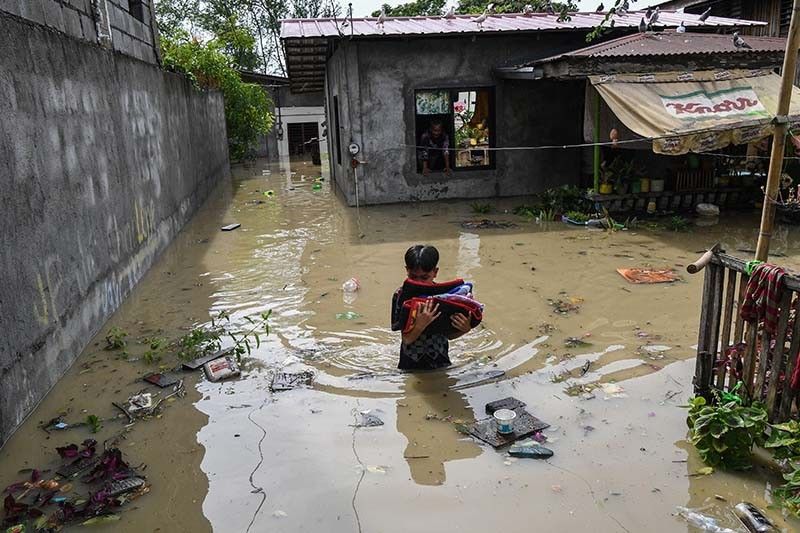Philippines, world leaders urged to ramp up climate action after 'Karding' onslaught

MANILA, Philippines — The onslaught of Super Typhoon Karding (Noru) is a reminder that the Philippine government and the world leaders need to act fast to fight climate change and mitigate its impacts, groups said Monday.
Karding, the strongest tropical cyclone to hit the country this year, ravaged the agricultural region of Central Luzon as it toppled trees and power lines and flooded low-lying communities.
The Philippines, one of the most vulnerable countries to the impacts of climate change, is affected by an average of 20 cyclones a year. Scientists warn that storms are becoming more intense as the planet continues to heat up because of human-induced climate change.
“Super Typhoon Karding is another grim reminder that the climate crisis is here and now, and that national and world leaders need to step up in terms of proactive action to mitigate and prepare for its impacts,” said Jon Bonifacio, national coordinator of Kalikasan People’s Network for the Environment.
He also stressed the need to rehabilitate and conserve natural barriers such as the Sierra Madre mountain range. Sierra Madre, the longest mountain range in the Philippines and the site of nearly half of the country’s surviving old-growth forest, historically serves as a buffer against storms that develop in the Pacific Ocean.
Sierra Madre remains under heavy threat of illegal logging, mining activities, and development projects.
“In this light, destructive projects such as the Kaliwa-Kanan Dam and attacks on conservation areas like Masungi Georeserve are direct threats to the lives of millions of Filipinos, and the Marcos administration, if it is sincere in its promise of climate action, should put a stop to this,” Bonifacio said.
Climate emergency, loss and damage
Aksyon Klima Pilipinas, a civil society network for climate action, called on the national and local governments to declare a climate emergency, and mobilize more resources and support to scale up adaptation and mitigation programs nationwide.
The climate emergency declaration, according to the group, should reduce the country’s reliance on planet-warming fossil fuels, uphold climate justice, and ramp up actions to avoid and minimize loss and damage.
Loss and damage refers to the costs that nations are already facing because of a warming world. According to the Department of Finance, climate-related hazards have caused P506.1 billion in losses and damage to the country from 2010 to 2020.
AKP stressed that loss and damage should be part of the agenda in COP27 climate talks in Egypt this November. Developed nations blocked the establishment of a funding facility that will help vulnerable countries like the Philippines and instead opted to initiate a dialogue on the topic in future talks.
“With every super typhoon or another extreme weather event striking the nation comes more loss and damage, some of which can never be recovered, and the cries of the earth and the poor that grow louder and louder,” it said.
RE-powered future
The Power for People Coalition reiterated its call for the Philippines to be fully powered by renewable energy as the country reels from the impacts of Karding.
“We know the climate emergency is happening because the world continues to use fossil fuels like coal and natural gas, despite warnings aired for decades that it would lead the world to disaster,” said Gerry Arances, convenor of P4P.
“Yet despite our country being a punching bag for supertyphoons, successive governments, including the current Marcos administration, continue to expand the use of fossil fuels for our country. How many more supertyphoons must hit us before our government wakes up to facts? It’s time to act, and act quickly,” he added.
The Philippines generates 76.1% of its power from coal and natural gas. While the Marcos administration has made a shift to RE sources a priority, his government is pushing for the development of natural gas — or fossil gas — that groups said may hamper a genuine transition to clean energy.
Greenpeace Philippine Lea Guerrero also said the Philippines should lead the call to hold the world’s biggest climate polluting business accountable and prioritize long-term, coherent plans for climate action.
“If the climate crisis is our new normal, it's time to ask ourselves if this is something we want to merely accept and endure year in and year out—or if we want to call for accountability from those most responsible for carbon emissions, particularly fossil fuel companies,” she said.
- Latest



























